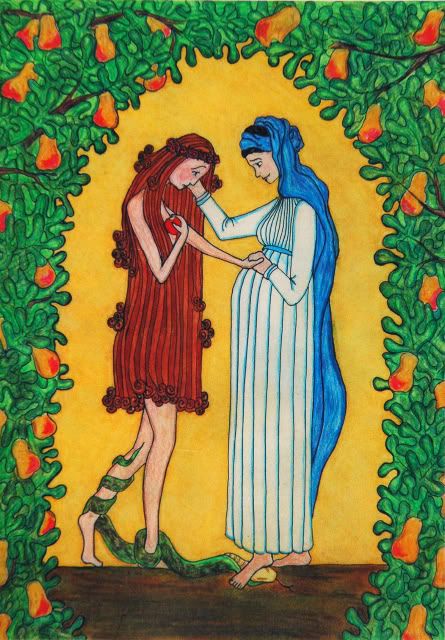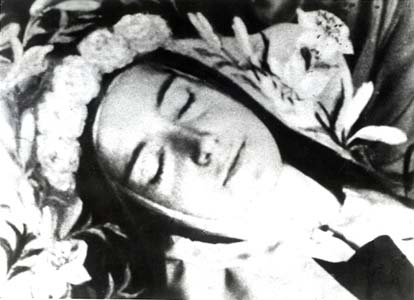
I know a few of you read my last post when I reflected on an experience I had as a hospital chaplain this summer, and those same people may be wondering, “Where did it go?”
Well!
A very dear sister here on Xanga very kindly messaged me her concern that despite the heavy cloak of anonymity provided in my account, it may yet violate HIPPA policy so rather than take a chance, I deleted the entry. Oh well! So thank you (you know who you are)! 
I do not think, however, that reflecting on what I learned will anger the HIPPApotamus at all.
During the summer I saw death unexpected and expected, criminal and tragic, and I have seen death approaching in ways that terrified people or brought them tremendous peace. I have seen grown men fall to the floor weeping, people trying to invoke the power of Christ to bring people back, I’ve seen people so hysterical that they vomit in the trash bin, so weak with sadness that they cannot stand. I witnessed and experienced things as a young chaplain I thought would be the accumulation of years of ministry as opposed to a mere three months. But in each circumstance there I was, waltzing with death, unsure of where the next dance step was, if the tempo was about to speed up or slow down, or if I would step on someone else’s toes.
I would say that there are three main lessons I learned as a chaplain, at least as they regard death.
1.) As a chaplain, you face death alone.
On my first day as chaplain, without any formal preparation or training, I was sent to the ER to be with a family who suddenly lost a loved one to a lightning strike. “Are you kidding me?” was my initial reaction. My only experience with death was the safe and at-a-distance kind like at a funeral, where there is the cushion of time having passed as well as the undertaker’s work with makeup and nice clothes. Standing there with the family as they viewed what remained of their loved one was incredibly humbling, and while I was certainly not physically alone I definitely found myself standing in a lonely spot. I did not know the victim or any of the family yet because of the life I have chosen, they were suddenly my people, so I loved them. On the other side there was Death, this enormous something, like a giant tidal wave towering over me and while I was with that family I was the only one facing it while they comforted each other, reminisced about the lost one, and considered the future. Certainly they were dealing with the aftermath of Death’s work, they were not facing it.
Part of the grace of being a chaplain, I found, is knowing that while your “job” per se often leaves you to face the hard stuff alone, you aren’t actually alone. You stand there, ideally, as a sort of anchor, a deeply rooted tree in the face of a terrifying wind your people are otherwise helpless against. When they are tossed about by sudden realities, by pain and despair, they automatically turn to you (whether you are a 26 year-old college student or not!) for guidance, comfort and prayer and a reminder that death is not the final say. You are supported in this by Jesus Christ, for you are His minister, you are supported by the Holy Spirit that, if you are humble and get out of His way, will guide you in everything you are to do and say. You have a Father looking out for you and a myriad of saints who have “been there, done that” and are constantly praying for you. Death can be intimidating but, with all this help, particularly the company of the One who has subjected Death to Eternal Life, amazing things are utterly possible. With such help I was able to lift those weeping, grown men from off the floor, hold the trash bin for those sick with sadness, bring peace to those in utter hysterics, and so on. Being a chaplain is letting the tidal wave of Death break around your back, letting the cold soak you to the bone so that the brute reality doesn’t strike those on the other side of you quite so hard in their moment of vulnerability. It leaves you exhausted and shaking at the end of the day, but you go to bed praising God and remembering that regardless and with His help, you stood your ground.
2.) As a chaplain, the hardest thing to do is to do nothing.
As a man in particular, there is an innate drive to be helpful, to “do something about it,” “it” being whatever is “wrong.” But sometimes even when we are intending to be helpful we can end up being quite the opposite. I learned this summer that it is better to be harmless than helpful.
For example, most of the extreme situations I found myself in this summer were utterly insane and as a reaction my man-instinct said, “Do something!” Praise God, who created me with enough sense to ask myself “What can I do?” instead of just trying things out until something worked! Instead of assuming that I could somehow pray the perfect prayer that would calm everyone down, I just remained silent until someone would ask, “Oh chaplain, would you say a prayer for us?” When offering that prayer instead of bulldozing through any tears, interruptions or overriding anyone else who tried to pray, letting things happen as they may. What is a “perfect” prayer anyways? In such circumstances I found the perfect prayers were not the ones I offered but the ones I fostered, encouraging those present to pray as they were moved. My God, brothers and sisters of Xanga, I heard some of the most beautiful prayers of my life from the lips of people in the pits of despair, for those prayers were written with the blood of love and the tears of anguish, all eloquently penned with the very Cross.
Nine times out of ten, however, my “job” was filling cups of water (or ice if they were so upset they could not swallow anything), holding a box of tissues, going to get the nurse, holding a hand, pushing a wheel chair, and other very simple tasks. As simple as all this seems on the surface, though, it taught me so much about Christ who, “though he was in the form of God…emptied himself, taking the form of a slave…” (Phil. 2:6-7) Sure I’m well-educated, healthy, young and strong, but as a minister I have to be humble enough to let Christ do His work, and oftentimes His work is so simple and seemingly useless—almost insulting to the one doing the work. This is exactly the paradox of Christ, the beautiful, perfect and divine God come to earth to toil in our human mess. While I delivered no life-changing sermons, performed no miracles, saved no lives but rather did tiny and forgettable things, I know that there is an account being taken, and it is in His Ledger that I want my deeds to be remembered in!
3.) As a chaplain, the most important thing you can do is be there.
As I mentioned, there were situations this summer that were completely off-the-wall insane, at least compared to anything else I had experience in life up to that point. The natural urge in every circumstance was to get out of there as fast as humanly possible! However, there is a reason why Catholic priests and religious (generally) wear distinctive garb: to witness conspicuously to the God we serve and have given our lives to and remind His people that God took on flesh and dwelt among us. The blacks and the collar of the clerical attire stands out in a crowd, and hopefully when someone sees that they instantly are reminded of God, of Church of Jesus Christ our High Priest. When I am standing in a small waiting room with fifteen hot, sweaty and upset people with a small garbage can full of vomit and a chair soaked with urine, nearly deaf from all the screaming and feeling utterly corned, I am standing right where Christ wants me, because I am standing right where He is standing, in the midst of His suffering people. Certainly a priest ministers the Sacraments which, God-willing, I will too one day, but this summer I was also engaged in sacramental ministry: that of ministering Christ’s presence. I was sent to people, places and situations which no nurse or doctor in the entire hospital was capable of or willing to do. I would be paged and come charging down the hall, encountering a very kind and capable nurse who would shake her head and say, “Chaplain, please go to them; there isn’t anything I can do, I’m just helpless!” Then I would think, “Well, sister, there is nothing I can do either except to be there.” This was often the hardest thing to do, even more challenging than the previous topic of “doing nothing!”
Being present to those people is more than being a warm body in a room. Being present requires attentiveness so that you are sensitive to possible needs (someone who has cried for thirty minutes straight will need water and likely will not ask for it) but also requires a humility on your part so you don’t assume needs and upset someone. Being present means constant and instant availability for prayer, comfort and service, even for very menial things. Being present, most importantly, serves as a reminder to those people who have lost a loved one that they are not alone, that you are there because God is. You, as a chaplain, are an incarnational reminder of the Incarnate God who, by virtue of your baptism and vocation, has delegated you to stand in His privileged place in that beautiful and heart-wrenching moment; you remind those people simply by your presence that God is also there with them. Who am I—a perfect stranger, a young kid—to stand there knee-deep in these personal, life-altering, private moments? Such times are intensely holy ground upon which only Christ Himself has any right to tread. Yet, for love of me and His people He sent me each time to remind them of His constant love and presence. I may have walked into those rooms feeling helpless and useless, but at the end of those experiences it was often that I was blessed with the gratitude of the people and the staff in the simple offering of, “Thank you so much, Chaplain, for being here.”
There is something intensely rewarding and consoling when capable and experienced medical professionals, when venerable elders who have seen and done it all, when other people who deserve far more respect for their life accomplishments than anything I’ve yet to add to my resume, are thanking me for what on the surface seems like a simple task—mere presence. But each time when that phone or pager rang it was because, regardless of the qualification, skill, capability or self-confidence of the other, I was the absolute only one that had any chance of success. Isn’t Christ simply amazing? This can only be Christ at work, for who else could bring peace, hope and love to a situation simply by being there? I certainly can’t!





